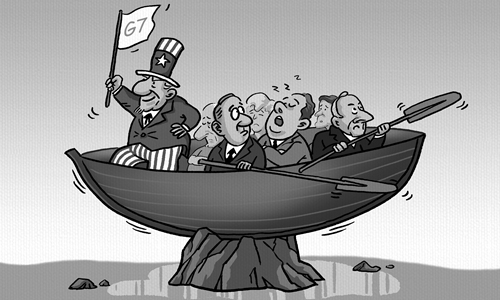EU explores international position amid Trump’s G7 expansion call
By He Zhigao Source:Global Times Published: 2020/6/4 23:20:21

Illustration: Liu Rui/GT
US President Donald Trump postponed the G7 summit, scheduled for late June, until at least September. Trump is also keen on expanding the bloc to 11 members including Russia, India, Australia and South Korea, or to 12 members, if Brazil joins the bloc.
German Councilor Angela Merkel has rejected the president's invitation to attend the summit in person. The Russian Foreign Ministry responded by saying that any global affairs could not be a success without China's participation. Again, the "America First" doctrine adopted by the Trump administration may come to nothing.
This diplomatic doctrine has reinforced major power competition and geopolitical rivalries. The intended expansion of G7 by Trump is the latest manifestation of his "American First" approach.
However, this approach brings about mounting xenophobia and nationalistic sentiments, and the US is walking on a path of self-isolation and exclusion. The ongoing violent protests in the US further expose the weaknesses and vulnerability of the US system.
As traditional allies of the US, European countries, especially Germany, are showing disappointment toward the Trump administration. The foundation of US-European Union solidarity has been eroded since Trump took office. Divergences between the two came to the spotlight in areas such as trade, security, energy, global governance and the Iran nuclear deal. The US has also breached the policy bottom line of the bloc several times. The unilateral stance of the Trump administration is contrary to the multilateral approach adhered to by Europe.
More importantly, the US hopes to create more division and a conservative worldview in Europe-Atlantic region, so that Washington could offset Russia's strategic influence and weaken the unity of Brussels. This has the ultimate aim of consolidating the US' political and military influence in Europe.
Meanwhile, the US has conditionally defined its allies and cooperative partners. If any country wants to get help or guarantee from the US, it must work for US interests. After the outbreak of COVID-19, the buck-passing act by the Trump administration has exposed the hypocrisy of US strategies and the lack of US leadership.
Merkel once underlined her doubts about the reliability of the US as an ally. French President Emmanuel Macron believed NATO is "brain-dead." With such disappointment from France and Germany, the two driving forces of the European integration process, the trans-Atlantic partnership will be reshaped.
There are some voices within the EU to support a better US-Europe relationship. They want to reshape a community of shared values. Some scholars and media emphasized that the common threat facing the US and Europe is China's rise or Russia's military threat. Some small powers in Europe have taken a proactive approach by turning to the US with the hope of forming close political and military alliances.
For instance, Poland thinks Europe lacks the ability to achieve strategic autonomy and NATO is the main force to cope with threat from Russia. Others put their bet on both sides, hoping to economically relying on the EU and China while militarily leaning toward the US. Faced with strong external forces, disputes within Europe will further magnify.
Amid the changing global pattern and China-US strategic competition, Europe cannot be closed off to itself. It faces a more complicated and difficult political environment - it needs to find its international positions with major power rivalries. In fact, the gap between core European countries and marginalized European countries is widening, and so is the trust between Brussels and its member states.
Europe needs a clear definition of its core interests and how it will maintain them. The EU should restart its integration process and mobilize its resources in order to help member states solve their diplomatic problems. Germany, in particular, should ease divergences over policies among its political parties and play a leadership role in European integration.
The stance of some EU figures and leaders in some European countries illustrates a single point: the EU should achieve strategic autonomy and raise Europe's voice globally.
German Foreign Minister Heiko Maas has called for an alliance for multilateralism. This means Germany and the EU do not want to pick a side between China and the US. They want to adopt balanced diplomacy. Their approaches toward the US, Russia and China will be a test of their diplomatic strategies. It will ultimately determine their global status.
The author is a research fellow with the Institute of European Studies, Chinese Academy of Social Sciences. opinion@globaltimes.com.cn
Posted in: VIEWPOINT